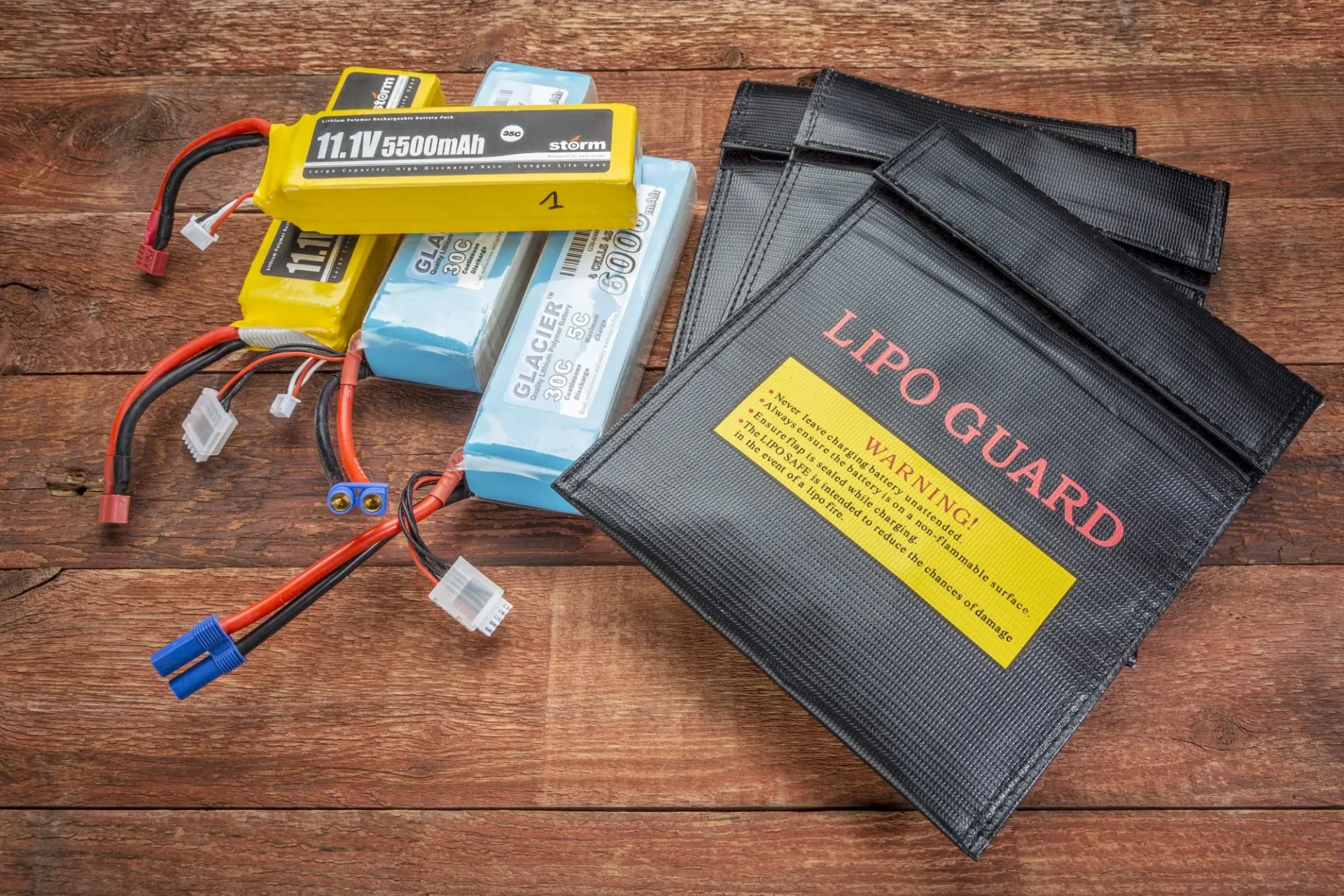LiPo battery safety and care
LiPo batteries are the best in terms of performance, but they need to be treated with respect. If they are not charged, stored, and used correctly, they will not only quickly become unusable, but they can become explosively flammable.
Before Charging LiPo Batteries
- read the lipo battery manual and charging instructions
- Always check the voltage of batteries before each charge session in order to ensure they are at or above the minimum safe starting voltage. If their starting voltage is below recommended levels then your batteries have been over-discharged or have experienced a failure and should NOT be charged.
- Always check the battery before charging for any type of damage. Check the battery packaging, wires and connectors for defects, which may cause a short circuit and eventual battery failure.
Charging LiPo batteries
- Only use a charger designed for a lithium polymer or lithium-ion battery. Many chargers have multiple modes for different types of batteries. Check out our chargers here.
- You should charge lipos away from any flammable martials.
- Never charge batteries inside of your model
- Never charge batteries below freezing (0°C, 32°F)
- Never charge Batteries that are hot to the touch (above 100° F).
- The charger should never be set to charge batteries at a rate greater than 1C (one times the capacity of the battery in amp hours)
- Never overcharge batteries over their rated maximal voltage (4.2V/cell for a LiPo).
- Using a LiPo pouch to charge will prevent fire expanding if there is a fire
- Charge away from your living area. i.e. do it in an out building
- NEVER charge in the house over night near flammable objects.
How to discharging LiPo batteries
- Never discharge batteries at amperage rates higher than specified on the label
- Never allow the temperature of batteries to exceed 140° F during discharge.
- Never discharge battery to a level below 3V per cell under load. For most drone batteries, the recommended cut off voltage is 3.5V per cell.
- Batteries can still accidentally leak for about an hour after discharge, and that reaction with air may cause the chemicals to ignite. Keep batteries in a safe area away from any combustible materials and observe them for an hour after discharge.
How to store LiPo batteries
- Never store loose batteries together. The batteries’ terminals may contact one another, causing a short circuit.
- Never store batteries in extreme temperatures or direct sunlight. The battery should be stored within -10℃~45℃ range environmental condition. If the battery has to be stored for a long time (more than 3 months), the environmental condition should be:
- Temperature: 23±5℃ Humidity: 65±20%RH
- The voltage should be 3.6V~3.9V range per cell.
- Always disconnect Batteries when not in use and store batteries in a non-conductive and fireproof container.
- Never alter, puncture or impact Batteries or related components.
Spotting a broken liPo battery
- The RC servo for steering will work, but the speed controller will not function. This is because the ESC will
- LiPo batteries that are beyond repair will typically show no voltage from one cell or more. The Spotting a broken liPo battery chargers we sell are able to act as a battery meter and will allow you to check each cell.
- Broken batteries will typically be “puffed up” in that they are larger than they were originally
- Any battery with these symptoms should be separated from other batteries and disposed of as soon as possible.
General LiPo battery Safety
- Keep your batteries away from your living area when unsupervised or charging
- Never strike a battery with any sharp edges
- Never open or deform the folding edge of a cell
- Never drop, hit or bend batteries
- Never disassemble the cells. The disassembling may generate an internal short circuit in the cell, which may cause gassing, firing, or other problems
- Never incinerate nor dispose of batteries in fire. These may cause firing of the cells, which is very dangerous. Additionally, never be soak batteries with liquids such as water, and especially not soft drinks, juices or coffee (never thought I would have to add that one as a tip!).

